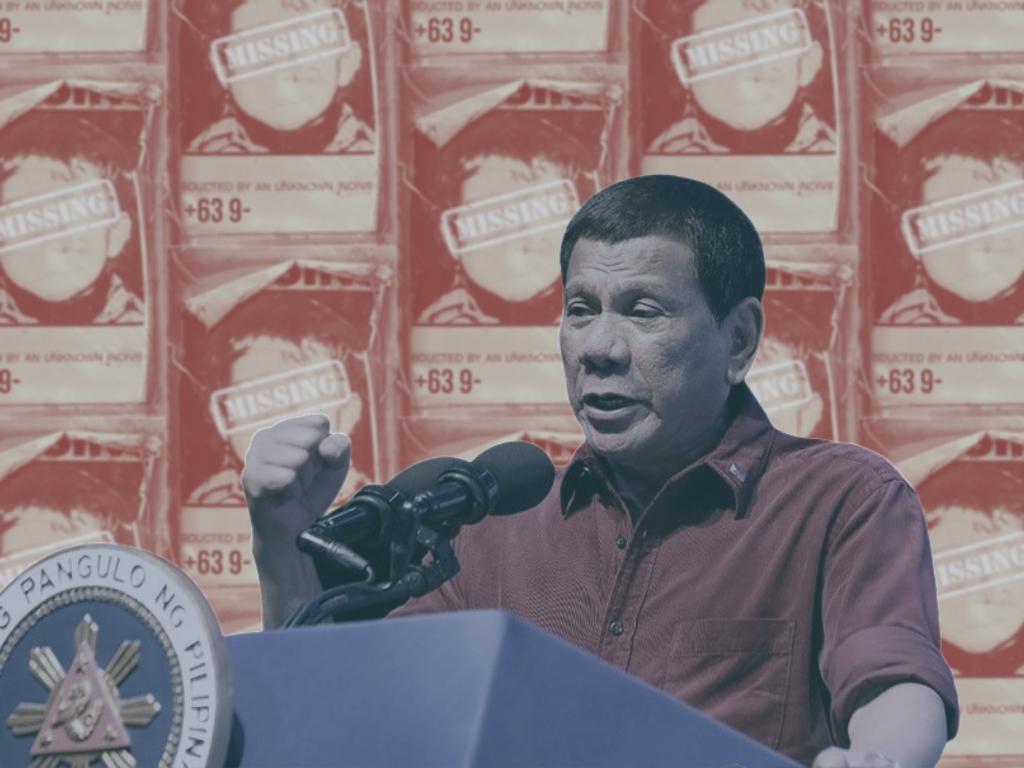PCIJ recalls the disappeared during Duterte’s drug war
CHEERS TO the Philippine Center for Investigative Journalism (PCIJ) for its report on enforced disappearances under the Duterte administration’s anti-drug “war.” Written by Aie Balagtas with photos by Raffy Lerma, “The desaparecidos of Duterte’s drug war” was posted on April 11. It is a gripping reminder of the terror wrought by Duterte’s campaign to end the drug problem, which left thousands of Filipinos dead or disappeared.
Balagtas starts and ends the report with a mother’s anguished wait for a son who had gone out to buy soda and who never came home. Years later, Marina Cerbito has gone to fortune tellers in the hope of some “proof of life” for her son Reymond. She has lingered on the paths he used to take when coming home, in the vain hope of meeting him. Marina shares her pain with many other mothers whose sons have disappeared.
In the first two years of the administration, media reports tracked the number of dead bodies collected or left unburied in the streets, referring to police records when these were available. In his report, Balagtas found an anonymous source she calls “Dimaala,” who recounted how he and others were asked by the police to target young people for killing as alleged drug addicts or pushers.
The report’s televance to the May election is obvious. President Duterte is not running for office, but he has clearly handpicked enough candidates who, if elected, will protect him from prosecution for the crimes committed during his watch.
Ex-police agents detail abductions, killings
Police accounts have routinely justified the killing of alleged drug suspects supposedly because they resisted arrest (“nanlaban”). Witnesses, however, have belied those claims, recalling the abduction of persons from their homes or their neighborhoods. The disappearances add to the other crimes noted in media reports on the conduct of the “drug war.”
According to “Dimaala,” Marina Cerbito’s son, Reymond, was among those he and another police agent abducted and killed at the behest of local police. He also said they were also ordered to sell the corpse for use in some gambling scheme.
A month later, Dimaala and a certain “Romero,” again acting on police orders, abducted and killed two others. Although official police reports on the incident claim that the two had resisted arrest, PCIJ recalled how an anonymous source had tipped journalists off on a dozen killings scheduled to take place in Dimaala and Romero’s “area.” PCIJ noted that no news account mentioned that fact.
The two police agents told PCIJ that they took their victims to a holding area the police call a “compac,” where the killing of drug suspects routinely took place.
Martial law echoes
The report cited other groups that flagged alarming patterns in the disappearances connected with Duterte’s war on drugs. PCIJ also noted the resemblance of those cases to those during martial law, when numerous suspected insurgents and activists simply disappeared, and their bodies never found.
Nilda Sevilla, co-chairperson of Families of Victims of Involuntary Disappearance (FIND), and whose own brother was “disappeared,” stressed the “mental torture” experienced by families that have to live with prolonged uncertainty over the fate of their loved ones.
Sevilla called attention to the campaign against drugs’ targeting the poor. Most of the disappeared were impoverished, said Sevilla, and were “persecuted for their socioeconomic class.” FIND’s numbers show 24 drug war-related disappearances out of 50 disappearances during the Duterte administration.
The PCIJ report included Amnesty International’s observation that enforced disappearances are tools of oppression employed by “autocratic administrations such as Duterte’s.” Balagtas also cited Carlos Conde of Human Rights Watch, who said the organized conduct of the killings is an indication of the involvement of State agents in the disappearances.
No uniform procedure for police investigations
There is no uniform government procedure on investigating disappearances, a FIND researcher also told PCIJ, adding that relatives looking for their lost kin end up going from one government office to another to no avail. The systematic lack of information facilitates the loss of critical and crucial information necessary for establishing accountability.
In 2016, the Philippine National Police issued a memorandum providing guidelines on the investigation of cases of missing persons, requiring police to log cases in the official PNP database, and to issue written updates on a missing person to the individual’s family or the press. But the victims’ kin said in the PCIJ report that the officials they spoke to did not follow those procedures.
At the end of Duterte’ssix-year term, many voters may have forgotten the terror that reigned in the communities targeted by “Tokhang.” The campaign to get a community to fight illegal drugs turned into a veritable blood bath for the poorest of the poor. Records, including those of the PNP, have shown how so many were killed during police operations or by surrogate groups under police orders. But so far, there has been little effort to hold anyone responsible
Media’s review of Duterte’s term must include the facts and figures involved in the conduct of the “drug war.” The campaign unleashed state forces against the people the State is mandated to protect. Public memory may be short, but the media can remind every one of the violence suffered by the likes of Reymond Cerbito, and the anguish of their kin.

Leave a Reply